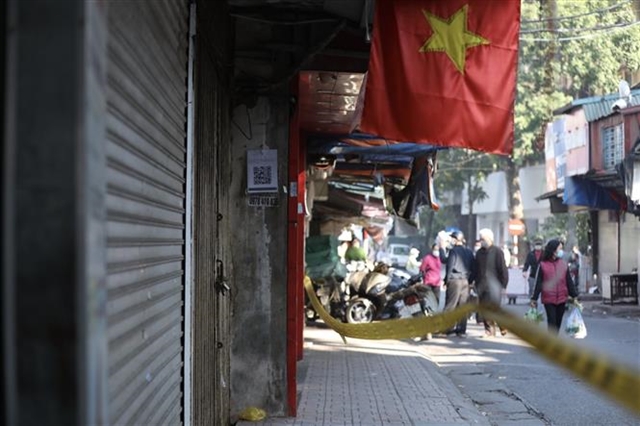 Society
Society


|
| Shops on Nguyễn Công Trứ Street, Hà Nội have to close until further notice. — VNA/VNS Photo |
HÀ NỘI — The Ministry of Health has dispatched an official document to chairpersons of people's committees of provinces and cities calling for strengthening the implementation of measures to prevent and control the COVID-19 pandemic as the country braces for the possibility of more cases caused by the Omicron variant.
The COVID-19 pandemic in the world continues to be complicated in many countries. On November 25, 2021, the World Health Organization announced that it had recorded a worrying new strain of the SARS-CoV-2 virus, called Omicron (B.1.1.529), discovered in South Africa.
By December 2, 2021, at least 27 countries and territories have recorded this mutation. The new strain has not been detected in Việt Nam so far, but the risk of it entering and spreading into our country is huge, the health ministry said.
According to the ministry’s request, localities must continue to effectively implement Resolution No. 128/NQ-CP of the Government and Decision No. 4800/QD-BYT of the Ministry of Health; effectively implement the 5K message, administer vaccines and medicines, apply technology in pandemic control and prevention and treatment, and raise people's conscious levels.
Localities need to actively develop plans to be ready to respond to COVID-19 pandemic situations in their areas to reach the entire population as early as possible, as many as possible, and at grassroots levels.
Localities need to improve the capacity of health systems, especially at the grassroots level, ensure adequate drugs, medical supplies and equipment according to the motto four on the spot. Also, they should have a plan to mobilise health workers when needed; at the same time, continue to promote the role of the community COVID teams and mobile health stations to prevent patients from not being able to contact medical facilities, not being consulted, or not provided with treatment drugs.
The Minister of Health asked localities to direct the strengthening of supervision and management of cases from overseas, especially cases coming to/from countries and regions that have recorded the Omicron mutation such as South Africa (South Africa, Botswana, Namibia, Zimbabwe, Eswatini, Lesotho, and Mozambique) as well as some European countries.
Localities also need to strictly conduct testing, quarantine, medical supervision and monitoring for people entering Việt Nam in accordance with regulations and strictly handle cases of violations of regulations on pandemic prevention and control.
The ministry also requests the improving key surveillance for influenza-like illness (ILI), severe viral pneumonia (SVP), event-based surveillance (EBS), performing testing of suspected cases of cough and fever for early detection of COVID-19 cases; proactively sending patient samples suspected of being infected with the Omicron variant to the Institute of Hygiene and Epidemiology, Pasteur Institute for testing and genetic sequencing. Timely medical isolation, thoroughly handling the outbreak to prevent larger spread and outbreak in the community is also of critical importance.
Localities are asked to speed up the progress of vaccinations for children aged 12 and older (priority is given to those aged 50 and older, people with underlying diseases) as soon as the vaccine is distributed.
They also need to review and expeditiously complete the basic full-dose vaccination for adults while deploying booster shots according to instructions by the Ministry of Health.
Regarding the treatment of COVID-19 patients, provinces and cities need to conduct comprehensive treatment and treatment stratification, trying to reduce deaths as a top priority.
Localities are asked to perform medical declaration, body temperature check; well organise the coordination and stratification of treatment; ensure adequate oxygen, ventilators, emergency beds and other necessary conditions as soon as possible. They also need to organise the use of drugs in the treatment of COVID-19 as soon as they are distributed and received.
At the same time, provinces and cities must ensure safety against COVID-19 in industrial parks and schools, while strengthening inspection of pandemic prevention and control at agencies, units, organisations and enterprises, especially at hospitals, production facilities, markets, supermarkets, railway stations, airports, bus stations. — VNS




